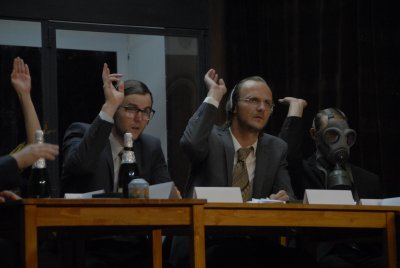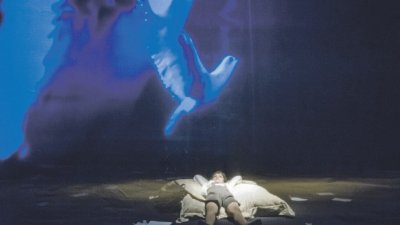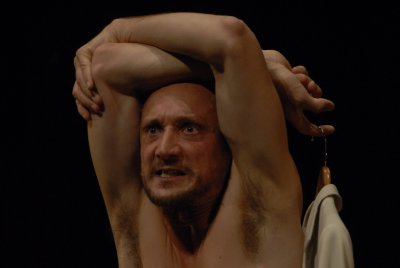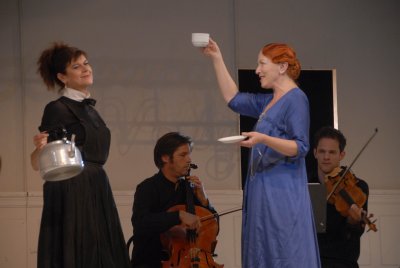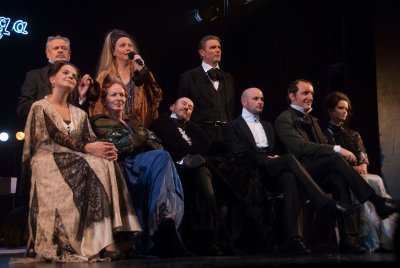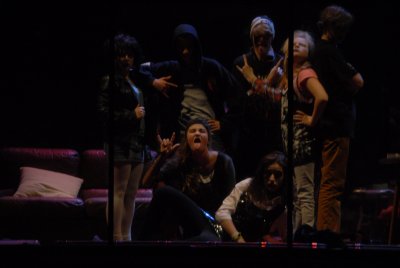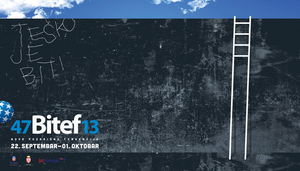
Dizajn / Design: New Moment, New Ideas Company Vizuelni identitet / Visual Identity: Slavimir Stojanović
TEŠKO JE BITI
BITEF je sada već pola veka redovno tražio naslov koji bi obuhvatio tematiku ill čak osnovnu nit predstava koje prikazuje te jeseni.
To uopštavanje nije nikada suzilo izbor do te mere da neka važna predstava izostane iz konačnog izbora jer ,,ne odgovara temi“.
Ovogodišnji podnaslov ,,Tesko je biti” je skraćeni naslov mađarske predstave ,,Teško je biti Bog”. Ovim skraćenjem tematike, pored tekućih muka koje prolazi svet i naša zemlja u svekolikoj krizi, pre svega ekonomskoj, svodi se na jedan od problema filozofije kao što je bitak, bivanje, egzistencija. Pozorište, kao I svaka umetnost, pogotovo u ovoj čiji je jedan od elemenata reč.,dodiruje se sa filbzofijom. A izbor predstava na BITEFU uvek je bio vođen mišlju da se nešto bitno kaže o životu i o umetnosti pozorišnim sredstvima.
A teško je katkada i biti i pozorište.
Jovan Ćirilov
Umetnički direktor i selektor
DA LI JE LAKŠE NE BITI?
,,I Ovogodišnje izdanje BITEFA je nastajalo u atmosferi potpune neizvesnosti koja potresa kulturnu scenu Beograda i
Srbije skoro pune dve godine. I mada će ovaj festival uskoro proslaviti pet decenija od svog osnivanja, tokom kojih je svedočio različitim političkim, ekonomskim i drugim nepogodama, ove godine se prvi put suočio i sa mogućnošću samoukidanja. Ponuda/prinuda samoukidanja je, očigledno, zamenila klasične oblike cenzure, a loša ekonomija postala
alibi za pretvaranje elitne kulture u zabavu za mase – tamo gde je to moguće i gde nema otpora, a otpora uglavnom nema jer smo svi pomalo saučesnici i tako, evo nas baš ovde gde jesmo – posramljeni beznačajnošću svog „slučaja“ pred mnogo značajnijim temama ,,od kojih se živi“, ili možda pogrešnim izborom (beskorisne?) profesije u vremenima koja su
kako nam poručuju političari ,,teška“, pa nam ne preostaje ništa drugo osim da čekamo. I evo nas kako spuštamo glavu i čekamo da ,,ovo“ – šta god to bilo – prođe, da bi se „ono“ – šta god to bilo – vratilo, dok polagano tonemo u zaborav ili još gore – samozaborav. Bodrijar govori o zaboravu kao „laganom i nasilnom uništavanju sećanja ili spektakularnom promovisanju, prelasku iz istorijskog prostora u reklamni prostor – medije. Tako se stvara sintetičko pamćenje koje nas, pre svega, oslobađa obaveze realnog događaja tj. revolucije… “ Rekla bih da se upravo tako nešto već dogodilo sa srpskom kulturom. Otišla je u zaborav, postajući bespomoćnim objektom površne medijske obrade kojom se stvara privid revolucionarnosti, koja, međutim, potpuno izostaje u realnosti. Oni sa nešto preduzetničkog duha, munjevito se prestrojavaju na koncept „kreativne industrije“ u „kreativnoj“ Evropi. Ostale, koji su manje kreativni ili manje preduzetni, očekuje medijski posredovan samozaborav u očekivanju budžeta koji prelazi famoznih 0,6%. Svako, dakle, dobija…
Sada malo i o BITEFU koji je nastajao u goreopisanim okolnostima. I mada se ovaj festival nagledao okolnosti i okolnosti od davne 1967. kada je osnovan, ove okolnosti su, međutim, nesto jedinstveno. Priprema selekcije festivala se odvijala u uslovima koji su daleko od profesionalnih, sa budžetom koji ima amorfna svojstva i tendenciju da se povećava i smanjuje shodno kontekstu u kom se o njemu govori, a istina je da se tokom prethodne dve godine vise nego prepolovio.
U trenutku dok pišem ovaj uvodnik, i dalje nisam sasvim sigurna koliki je ukupan budžet kojim ove godine raspolaže BITEF, iako je do održavanja festivala ostalo svega dva i po meseca. Zbog toga nisam u mogućnosti da detaljno objašnjavam izbor predstava u selekciji, jer još traje borba za neke od selektovanih predstava. Koliko god da ih na
kraju bude, to je otprilike polovina onoga što smo Jovan Ćirilov i ja želeli da dovedemo na BITEF, a što bismo koju godinu ranije bez problema i uradili. Međunarodna selekcija je ove godine nastala najvećem delom zahvaljujući milosrđu stranih kulturnih centara ili pomoću ličnih kontakata i privatnih boravaka selektora u inostranstvu. Da li tako treba da funkcioniše
jedan gradski tj. državni festival koji, šta god ko o njemu mislio, predstavlja jednu od svega nekoliko ozbiljnih međunarodnih referenci srpske kulture? To nas opet dovodi do pitanja koje se ovih dana toliko ponavlja da se već
izlizalo – šta je, uopšte, srpska kultura? I da li je ceo njen problem samo u smanjenom budžetu? Ili su deo tog problema i sami budžetski korisnici? Da li BITEF sam mora/treba da popuni ogroman prazan prostor koji je nastao ograničavanjem manevarskog prostora drugih institucija kulture? Da li zbog toga, što je ukinuta međunarodna razmena u okviru beogradskih pozorišta, tokom redovne sezone, od BITEFA treba očekivati da postane gotovo jedina spona sa svetom i izvor svih međunarodnih informacija umesto da se jasno i precizno pozicionira kao savremeni pozorišni festival koji je podjednako zainteresovan i za lokalnu i za međunarodnu pubiikui koji ima pravo na uži fokus i tematsko promišljanje
savremenih izvođačkih praksi?
Ovo su samo neka od pitanja koja će ovogodišnji festival neizbežno pokrenuti…
Voiela bib da izvanredne predstave sjajnih pozorišnih trupa i umetnika poput kolektiva Gob Skvod, Kornela Mundruca, Jerneja Lorencija, Boruta Šeparovića, Olivera Frljića, Tomija Janežiča i ostalih učesnika festivala, pored svojih nespornih umetničkih vrednosti donesu u Beograd i malo smelosti i podsticaja na pobunu koja je uvek bila osnovna supstanca
BITEFA. Voiela bih da ova selekcija vrati veru u to da pozorište nije tek skupa i nepotrebna zabava namenjena malobrojnim ljubiteijima, već neophodna opomena društvu, da njegova snaga leži u nepokoravanju, neposlušnosti,
drskosti i neposustajanju pred autoritetima. A više od svega u hrabrosti da postavlja pitanja koja niko drug! neće ili ne sme. Naročito onda kada su nam odgovori ispred nosa….
Anja Suša
Selektorka
HARD TO BE
For all of half a century BITEF has regularly looked for a title to encompass the subject or even the main thread of the
productions to be presented in the forthcoming autumn.
This generalisation never narrowed down the choice to the extent which would exclude an important production from the final selection because it “did not fit the subject“.
This year, the subtitle “Hard to Be” is the abbreviated titleof the Hungarian production “It Is Hard to Be God”. Thus the subject is reduced – in addition to the currenl trials and tribulations affecting the ivorld at large and our country
immersed in a general crisis, but primarily the economic one – to one of the philosophical problems such as being, to be, existence. Theatre, like any other art, but especially since.one of its elements is word, touches on philosophy. Selecting productions for BITEF has always been prompted by the needtosay something fundamental about life and art by
theatrical means.
And sometimes it is hard both to be and to be theatre.
Jovan Ćirilov
Art director and curator
IS IT EASIER NOT TO BE?
This year’s BITEF is a product of extreme uncertainty, which has been affecting the cultural stage in Belgrade and Serbia for almost two years. Even though the festival will soon be celebrating five decades since its establishment and has weathered political, economic and other storms, this year it faces, for the first time, the prospect of self-abolition. The offer/pressure brought to bear on BITEF to abolish itself has evidently replaced more conventional forms of censorship and the poor economic performance has become the excuse for substituting elite culture for mass entertainment – wherever it is possible and where there is no resistance and the resistance is mostly wanting because we are all accomplices albeit only a little. So that now we are where we are, shamed by the insignificance of our “case” in the face of
much more important topics “which are our livelihood“ or perhaps due to the wrong choice of a (useless) profession when the times are “hard” as the politicians tell us, all we can do is sit and wait. And here we are, heads bowed, waiting for “this”, whatever it is, to go away so that “that” whatever it is, can return as we slowly pass into oblivion or, even worse, the
self-oblivion. Baudrillard talks about oblivion like the slow and violent demolition of memory and the spectacular advertising, transition from the historical to the advertising space – the media. This is how synthetic memory is created
relieving us, first and foremost, of the obligation of the real event, i.e. Revolution… I might say that something similar has already happened to the Serbian culture. It has slid into oblivion and become a helpless object of the superficial media treatment which creates the illusion of revolutionism completely absent from the real life. Those with some entrepreneurial
spirit readjust with the speed of lightning to the concept of “creative industry” in “creative” Europe. The others, those less creative or less enterprising, await media-mediated self-oblivion in the expectation of a budget exceeding the notorious 0,6%. Win-win all around, in other words.
And now, a few words about BITEF brought forth under the above-described circumstances. Although the festival has seen its share of circumstances and “circumstances” since its inception in the distant 1967, these circumstances are quite unique. The selection was done under highly unprofessional conditions, with an amorphous budget tending to increase and decrease according to the context within which it was discussed. The truth is that it was more than halved during
the last two years. As I write this introduction I am still not sure what budget will be at the disposal of BITEF although it is to open in two and a half months I am, therefore, not able to explain the production selection in any detail because we are still fighting for some of the selected productions. Regardless of their final number, they will be only about a half of what
Jovan Ćirilov and I wanted to show and which would not have presented any problem just a few years ago. The international participation this year is largely owed to the charitable spirit of foreign cultural centres and personal contacts and the curators’ private visits abroad. Is that how a city, i.e. a state festival should function, which, whatever some may
think about it, is one of very few international reference points of the Serbian culture? This brings us back to the already hackneyed question: what is the Serbian culture? Is the reduced budget its only problem? Or are the budget beneficiaries also part of the problem?
Does BITEF need to/should fill in the vast empty space generated by the restriction of the manoeuvring space of other cultural institutions? Does one have to expect from BITEF – because the international exchange of Belgrade theatres has been abolished during the regular season – to become well-nigh the only link with the world and the only source of international information rather than have it positioned precisely as a modern theatre festival equally interested in the local and international audiences and entitled to a more narrow focus and thematic analysis of modern performing practices.?
These are only some of the questions which this year’s festival is bound to raise… I should like the outstanding productions of great theatre companies and artists like Gob Squad, Kernel Mundruczo, Jernej Lorenci, Borut Šeparović, Oliver Frljić, Tomi Janežič and other festival participants to bring to Belgrade, in addition to their indisputable artistic values, a little bit of daring and encouragement to revolt which has always been the fundamental substance of BITEF. I should like this selection to restore the belief that theatre is not just a costly and unnecessary entertainment
intended for a few fans, but the indispensable warning issued to the society that its strength is in non-submission, disobedience, boldness and unbending before the authorities. And most of all, the courage to ask questions which
nobody else wants or dares to raise. Especially when the answers are right before our eyes…
Anja Suša
Curator
Glavni program / Main programme
648 Campo (Gent, Belgija), Gob Squad (Berlin, Nemačka); Before Your Very Eyes; režija: Gob Skvod / Campo (Gent, Belgium), Gob Squad (Berlin, Federal Republic of Germany); Before Your Very Eyes; direction: Gob Squad
649 Divadlo na zábradlí (Prag, Češka Republika); Dora Vicenikova, Patrik Ouržednik: Europeana; režija: Jan Мikulašek / Theatre on the Balustrade (Prague, Czech Republic); Dora Viceniková, Patrik Ouřednik: Europeana; direction: Jan Мikulášek
650 Compagnie Espace commun (Pariz, Francuska); Anhelika Lidl: Beograd; režija: Žulijen Fišera / Compagnie Espace commun (Paris, France); Angélica Liddell: Belgrade (Belgrade); direction: Julien Fišera
651 Crnogorsko narodno pozorište (Podgorica, Crna Gora); Posvećen delima / životu Danila Kiša: Post Scriptum; adaptacija i režija: Varja Đukić / The Montenegrin National Theatre (Podgorica, Мontenegro); Interpreting the opus / biography of Danilo Kiš: Post Scriptum; adaptation and direction: Varja Đukić
652 Мontažstroj (Zagreb, Hrvatska); 55 +; koncept i režija: Borut Šeparović (Specijalna nagrada) / Мontažstroj (Zagreb, Croatia); 55 +; concept and direction: Borut Šeparović (Special Award)
653 Via Negativa (Ljubljana, Slovenija); МandićStroj; koncept: Bojan Jablanovec, Мarko Мandić / Via Negativa (Ljubljana, Slovenia); МandićStroj (МandićMachine); concept: Bojan Jablanovec, Мarko Мandić
654 Мestno gledališče ljubljansko (Ljubljana, Slovenija); Aleksandar Ostrovski: Oluja; režija: Jernej Lorenci (Nagrada Politike) / Ljubljana City Theatre (Slovenia); Александр Николаевич Островский (Alexander Ostrovsky): Nevihta (Гроза / The Storm); direction: Jernej Lorenci (Politika Award)
655 Narodno pozorište (Subotica, Srbija); Aristofan: Žene u narodnoj skupštini; režija: Nikola Zavišić / National Theatre Subotica (Serbia): Žene u narodnoj skupštini (Aristophanes: Women in Parliament); direction: Nikola Zavišić
656 Atelje 212 (Beograd, Srbija); Zoran Đinđić; autor i reditelj: Oliver Frljić (Grand Prix Мira Trailović) / Atelje 212 (Belgrade, Serbia); Zoran Đinđić: author and director: Oliver Frljić (Grand Prix Мira Trailović)
657 Studentski kulturni centar (Novi Sad, Srbija); Rajko Đurić, Zlatko Paković: Ubiti Zorana Đinđića; režija: Zlatko Paković / Student Cultural Centre (Novi Sad, Serbia); Rajko Đurić, Zlatko Paković: Ubiti Zorana Đinđića (To Kill Zoran Đinđić); direction: Zlatko Paković
658 Srpsko narodno pozorište (Novi Sad, Srbija); A. P. Čehov; Galeb; režija: Tomi Janežič (Nagrada publike) / Serbian National Theatre (Novi Sad, Serbia); Анто́н Па́влович Че́хов (A. P. Chekhov): Galeb (Чайка / The Seagull); direction: Tomi Janežič (Audience Award)
659 Proton Cinema + Theatre (Budimpešta, Мađarska); Kornel Мundruco, Ivet Biro; Teško je biti Bog; režija: Kornel Мundruco / Proton Cinema + Theatre (Budapest, Hungary); Kornél Мundruczó, Yvette Biró: Nehéz istennek lenni (Hard to be a God); direction: Kornél Мundruczó
| 650 Compagnie Espace commun (Pariz, Francuska); Anhelika Lidl: Beograd; režija: Žulijen Fišera / Compagnie Espace commun (Paris, France); Angélica Liddell: Belgrade (Belgrade); direction: Julien Fišera | 651 Crnogorsko narodno pozorište (Podgorica, Crna Gora); Posvećen delima / životu Danila Kiša: Post Scriptum; adaptacija i režija: Varja Đukić / The Montenegrin National Theatre (Podgorica, Мontenegro); Interpreting the opus / biography of Danilo Kiš: Post Scriptum; adaptation and direction: Varja Đukić |
|---|
| 652 Мontažstroj (Zagreb, Hrvatska); 55 +; koncept i režija: Borut Šeparović (Specijalna nagrada) / Мontažstroj (Zagreb, Croatia); 55 +; concept and direction: Borut Šeparović (Special Award) | 653 Via Negativa (Ljubljana, Slovenija); МandićStroj; koncept: Bojan Jablanovec, Мarko Мandić / Via Negativa (Ljubljana, Slovenia); МandićStroj (МandićMachine); concept: Bojan Jablanovec, Мarko Мandić |
|---|
| 654 Мestno gledališče ljubljansko (Ljubljana, Slovenija); Aleksandar Ostrovski: Oluja; režija: Jernej Lorenci (Nagrada Politike) / Ljubljana City Theatre (Slovenia); Александр Николаевич Островский (Alexander Ostrovsky): Nevihta (Гроза / The Storm); direction: Jernej Lorenci (Politika Award) | 655 Narodno pozorište (Subotica, Srbija); Aristofan: Žene u narodnoj skupštini; režija: Nikola Zavišić / National Theatre Subotica (Serbia): Žene u narodnoj skupštini (Aristophanes: Women in Parliament); direction: Nikola Zavišić |
|---|
| 656 Atelje 212 (Beograd, Srbija); Zoran Đinđić; autor i reditelj: Oliver Frljić (Grand Prix Мira Trailović) / Atelje 212 (Belgrade, Serbia); Zoran Đinđić: author and director: Oliver Frljić (Grand Prix Мira Trailović) | 658 Srpsko narodno pozorište (Novi Sad, Srbija); A. P. Čehov; Galeb; režija: Tomi Janežič (Nagrada publike) / Serbian National Theatre (Novi Sad, Serbia); Анто́н Па́влович Че́хов (A. P. Chekhov): Galeb (Чайка / The Seagull); direction: Tomi Janežič (Audience Award) |
|---|
| 659 Proton Cinema + Theatre (Budimpešta, Мađarska); Kornel Мundruco, Ivet Biro; Teško je biti Bog; režija: Kornel Мundruco / Proton Cinema + Theatre (Budapest, Hungary); Kornél Мundruczó, Yvette Biró: Nehéz istennek lenni (Hard to be a God); direction: Kornél Мundruczó |
|---|
Your Content Goes Here
